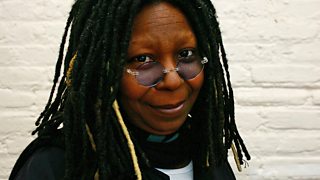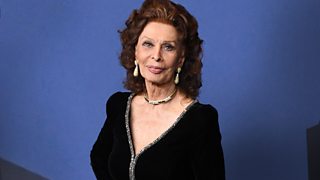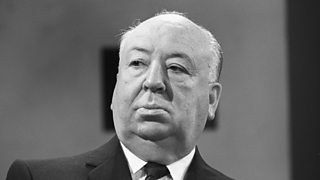Eight things we learned from Steven Spielberg's Desert Island Discs
While Desert Island Discs has cast away many major Hollywood stars and directors over the decades, Steven Spielberg has reached more people than any of them. His first blockbuster, Jaws, was released in 1975, and since then films such as ET, Jurassic Park, Saving Private Ryan, Schindler’s List, and West Side Story have revealed his versatility as a director, and delivered box office success around the world. He has won three Academy Awards, and has been nominated for best director eight times.
Here’s what we learned from his Desert Island Discs...
-
![]()
Listen to Steven Spielberg's Desert Island Discs
To hear full episodes with the full tracks first, listen on 大象传媒 Sounds
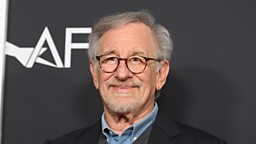
1. Steven’s mother was not like other suburban mums in Arizona in the 1950s
Home life as a child for Steven and his three sisters was often unconventional: his mother trained as a classical pianist, but Steven says, “I remember her as more of an Isadora Duncan, a freely expressive ballerina, than I do even as a pianist, because she used to express herself with these sort of classic ballet moves and just dance in the headlights, at a campfire on a camping trip, or just around the house.”
I look over at her and she's got tears in her eyes, and just before the song is over she jumps over on my side of the car and starts kissing me
"She had an army Jeep, a Korean War era army Jeep she drove all around Arizona, all around Phoenix. No seat belts. We were in the back in an open army Jeep being taken to school, being taken to dinner, being taken on camping trips and she just was literally someone who loved to live life.”
“She celebrated life. She lusted after life… She would throw her head back and just start singing for no reason because she was just so happy. And when she wasn't happy, she'd get into a foetal position and lie on the kitchen floor when we came home from school. There was such a range, a spread of feelings from my mom.”
2. His second disc reminds him of a tune his father used to whistle every day
“[This] is the song that identified my father to all of us,” says Steven, “because every time he came home from work, and he pulled the car into the driveway, he’d get out of the car and walk around to the front of the house whistling this.”
“He'd whistle it from the car, he'd open the front door - it would get louder and louder. We knew it was him, we knew it was home, we knew it was supper time and he’d walk into the house. And as he hung up his hat and his coat on the coat rack right in front of the front door, he would continue whistling it, and he would only stop whistling it when we started talking to him, ‘Hey, Dad!’ and he'd stop whistling, ‘How was school?... Yadda yadda...’ So it's the piece of music I most identify with my father.”
Steven’s second musical choice is Bach’s Little Fugue in G minor, which became very popular thanks to a much-loved orchestral arrangement by the conductor Leopold Stokowski.
3. A Beatles song proved the perfect soundtrack for a student romance
Steven selects Michelle, a song first heard on the 1965 Beatles album Rubber Soul – because it brings back a very specific memory: “I was a freshman in college and there was a girl I liked a lot,” Steven recalls.
“She would agree to let me take her out to dinner, or to a jazz club, or out to a movie but she would never ever, ever let me kiss her. And we were driving back from some place, and we pulled into the big parking lot by the dorms on the college campus at Long Beach.”
“Michelle came on. I think we heard it for the first time together on the radio, and the melody is just heart-achingly beautiful. I look over at her and she's got tears in her eyes, and just before the song is over she jumps over on my side of the car and starts kissing me.”
“And when I got to know Paul [McCartney] a number of years ago, that was one of the first stories I ever told him!”
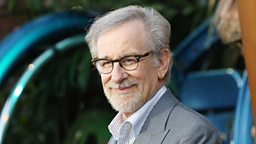
4. Screening his very first film was a life-changing moment
At the age of 10, Steven made a three-minute Western, in order to win a Boy Scout merit badge: “I had no editing equipment at home, so I did the whole thing - we call it ‘cutting-in-the-camera’ - where I would shoot a cowboy in one direction, then shoot a stagecoach robbery in another direction and then go back and shoot the people getting robbed in the stagecoach...”
They went crazy! They were laughing - and not at the movie, but they were laughing with the film
And when the whole scout troop were invited to see the film, it was an instant hit: “They went crazy! They were laughing - and not at the movie, but they were laughing with the film - because it was pretty silly stuff. I even recognised it being pretty silly. I was laughing, they were laughing.”
“At the end they applauded like crazy and I got bitten by this bug and that was it.” His first experience as a film director led to a lifelong obsession.
5. Making movies made his teenage years much more bearable
“I wasn't popular and I couldn't throw a football,” says Steven, “and the only thing that really was my ticket to some sort of limited popularity was the fact that I made these little movies when I was 12, 13, 14, 15, 16 - right up through college.”
“And I was able to get the most handsome [student]... the captain of the football team, who probably wouldn't give you the time of day at school, to give me all his entire Saturday to star in a movie.”
“In a way it was being able to say ‘Action!’ to somebody that wouldn't talk to me at school but would obey the word ‘action’ was kind of empowering.”
6. He hid in the bathroom to get his first experience of a Hollywood studio
Steven’s ingenuity led to an unofficial apprenticeship at Universal Studios while still at college: “I heard that there was a tour at Universal you could get on a bus,” says Steven, “so I took the tour on the bus and we had a bathroom break and everybody was allowed to get out, stretch their legs and go to the restroom.”
“I hid in the stall of one of the restrooms. I didn't come out until I was sure everybody had gotten back on the bus and the bus drove away. I spent the rest of my day literally walking around the lot, going into sound stages and watching some television being shot.”
“There happened to be a very nice man there named Chuck Silvers who ran the library at Universal where all the films were kept. When I said that I’d jumped off the bus because I wanted to be a movie director, he thought that was really original and terrific.”
Chuck gave young Steven a three day pass, allowing him to come back the next day – and on the fourth day he walked up to the studio gates without a pass, and the security guard waved him in: “I basically spent the next two months at Universal Studios. And that was how I became an unofficial apprentice that summer.”
7. His most recent film is his most overtly autobiographical
The Fabelmans is a coming-of-age drama telling the story of a young aspiring filmmaker, Sammy Fabelman, who – like Steven himself - uses film to make sense of the world around him.
It includes a reconstruction of Steven’s family home: “When I first saw my house being rebuilt, my childhood home being rebuilt on a sound stage, my first thought was, ‘Is this going to be the most self-indulgent thing I've ever asked people to accompany me through? Is this $40 million of therapy?’ I didn't know really what I was doing, except I was answering a need. I had been recently orphaned by the loss of both parents [and I wanted] to recapture some of those memories in some way that wouldn't seem too indulgent to actors I really respected like Michelle Williams and Paul Dano and Judd Hirsch. So it was a tightrope for a while.”
8. He believes the legacy of Schindler’s List is his most important achievement
Steven’s film Schindler’s List came out in 1993 to critical and box office success, and won seven Oscars. Based on a novel by Thomas Keneally, the film is the story of Oskar Schindler, a German industrialist who saved more than a thousand Jewish refugees from the Holocaust.
Although he read the book in 1982, Steven waited for a decade before starting work on the film: “I didn't think I was emotionally or even in terms of my skill sets as a filmmaker ready,” he says. “I had made a lot of popcorn movies and I made a lot of films based on relatively high concepts in terms of genre and I hadn't made any adult movies. I only really understood how to make that movie [Schindler’s List] once I had directed Color Purple and once I had directed Empire of the Sun.”
“I wasn't raised Orthodox. We were kind of reformed Conservative Jews. We were only Orthodox when my grandparents moved in or came to visit us for a week and then suddenly out went the lobsters and clams... and the meat and everything became kosher. And the second they left the lobsters came back!”
“It wasn't that I was so much in denial that I was Jewish,” explains Steven, “It was just I didn't make an issue of it. I didn't bring it up in conversation. I didn't talk about the fact I'll be out of school next week and the week after because of Rosh Hashanah or Yom Kippur, I never announced that ahead of time.”
“What came out of Schindler's List, which is more important than the film itself,” says Steven, “was the formation of the Shoah Foundation where I was able to empower interviewers and videographers to go all around the world, to gather personal first-person testimonies from Holocaust survivors, who voluntarily would come and talk to our cameras, to create an archive of remembrance. That's what I'm proudest of - now it's the USC Visual History Shoah Foundation.”



